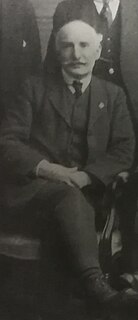Related Research Articles

The Scottish Trades Union Congress (STUC) is the national trade union centre in Scotland. With 40 affiliated unions as of 2020, the STUC represents over 540,000 trade unionists.
The General Secretary of the TUC is the chief permanent officer of the Trades Union Congress, and a major figurehead in the trade union movement in the United Kingdom.
Community is a British trade union which formed in 2004. The union represents workers in a diverse range of sectors, including iron and steel, justice and custodial, domestic appliance manufacturing, textiles and footwear, road transport, betting, the third sector, education and early years as well as the self-employed.

Fred Bramley was the second General Secretary of the British Trade Union Congress (TUC).
The President of the Trades Union Congress is a prominent but largely honorary position in British trade unionism.

The Amalgamated Society of Boilermakers, Shipwrights, Blacksmiths and Structural Workers (ASB) was a trade union in the United Kingdom. Many of its members worked in shipbuilding, in which industry it was the leading trade union, while over time it also developed strength in engineering and construction.

The International Federation of Trade Unions was an international organization of trade unions, existing between 1919 and 1945. IFTU had its roots in the pre-war IFTU.

The Irish Trades Union Congress (ITUC) was a union federation covering the island of Ireland.
The Sign and Display Trades Union (SDTU) was a British trade union that existed between 1917 and 1972.

The Trades Union Congress (TUC) is a national trade union centre, a federation of trade unions in England and Wales, representing the majority of trade unions. There are 48 affiliated unions, with a total of about 5.5 million members. The current General Secretary is Frances O'Grady.

The London Trades Council was an early labour organisation, uniting London's trade unionists. Its modern successor organisation is the Greater London Association of Trades (Union) Councils

Alan Andrew Hart Findlay was a Scottish trade unionist.
The Amalgamated Association of Beamers, Twisters and Drawers (AABTD) was a British trade union which existed between 1866 and 2002. It represented skilled workers in the cotton industry who were responsible for preparing warp yarns prior to weaving.
The General Council of the Trades Union Congress is an elected body which is responsible for carrying out the policies agreed at the annual British Trade Union Congresses (TUC).
The Parliamentary Committee of the Trades Union Congress was the leading body of the British trade union movement from 1871 until 1921.
Harry N. Harrison was a British trade unionist.
Mary T. Quaile was an Irish trade unionist.

John Inglis was a Scottish trade union leader.
John Davenport was a British trade unionist.
References
- ↑ MacDougall, Ian (2000). Voices from Work and Home. Mercat Press. pp. 154, 523. ISBN 1841830178.
- 1 2 Marsh, Arthur; Smethurst, John B. (2006). Historical Directory of Trade Unions. Vol. 5. Aldershot: Ashgate Publishing. p. 229. ISBN 085967990X.
- ↑ "Results of the Elections". Annual Report of the Trades Union Congress: 415. 1923.
- ↑ Annual Report of the Trades Union Congress: 55. 1940.
{{cite journal}}: Missing or empty|title=(help)